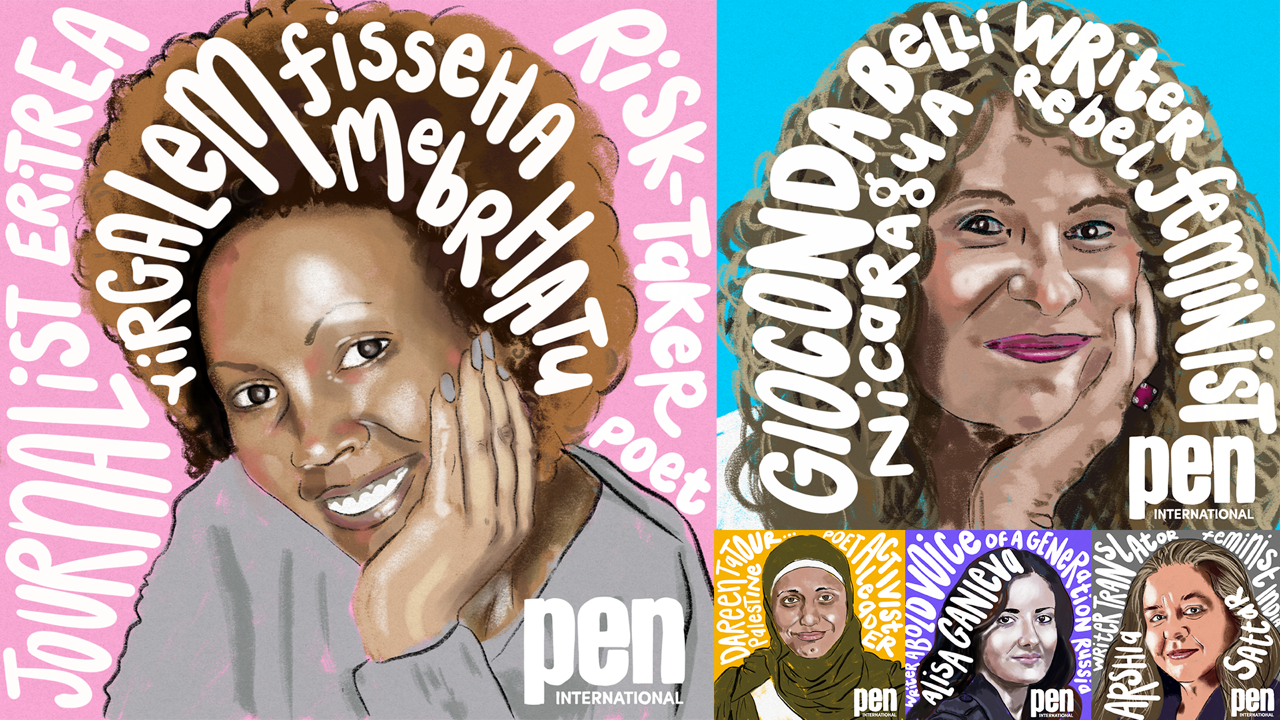This International Women's Day, meet five writers who are changing the rules
L-R: Yirgalem Fisseha, Gioconda Belli, Dareen Tatour, Alisa Ganieva, Arshia Sattar | Image credit: Carloline Glover @wiseguysspill
International Women’s Day, marked each year on 8 March, was established by the United Nations in 1975 as a moment to celebrate the achievement of women worldwide, while also highlighting the serious obstacles that women still face in all areas of life. PEN International, along with its Centres across the globe, has been rising to meet the challenges that women and girls face. In 2018 PEN International launched its Women’s Manifesto, a set of principles which aim to protect free expression for women by combating and eliminating the silencing of women worldwide, whether through censorship, harassment, or violence.
The Manifesto has been a rallying point for both PEN Centres and other organisations to progress the rights of women whether in education, publishing and literature or free expression. Since its launch the manifesto has been the foundation of PEN’s partnership with VIDA: Women in Literary Arts. In 2018 VIDA announced a new collaboration with PEN – the PEN VIDA Count – to monitor gender disparities in literature through PEN Centres across the globe. The VIDA count highlights imbalances in publishing by collecting data across genre, book reviews and journalistic by-lines, offering a gender-based assessment of the publishing world.
PEN's Women's Manifesto has also received the support of many notable figures and organisations, including Her Royal Highness Princess Nandi of the Zulu Royal House; First Minister of Scotland, Nicola Sturgeon; United Nations Women; and Moomin Characters Ltd.
PEN is building on the Manifesto this year by highlighting the work of five women writers and activists who have been on the forefront of literature and free expression across the world. PEN is proud to highlight:
Dareen Tatour, a Palestinian poet and citizen of Israel. Tatour was released from prison in Israel last September, having been held under house arrest since October 2015. The charges against her were related to a video in which she recites one of her poems “Resist, my people, resist them.” After several years under house arrest and several months in prison, Tatour was finally released in September 2018. She is the recipient of the 2019 Oxfam Novib/PEN International award for freedom of expression.
Gioconda Belli, an award-winning Nicaraguan poet, writer and activist and President of PEN Nicaragua. She has faced accusations of terrorist activity and writes under great risk in Nicaragua, a country in which over three hundred people were killed in protests against President Ortega’s government last year. She is the recipient of the 2019 Oxfam Novib/PEN International award for freedom of expression.
Writer, translator, scholar, and founder of Sangam House – a literary residency programme in India – Arshia Sattar has been a constant and formidable presence on the Indian literary awards scene, having been on several juries over the years. Her translations from Sanskrit of Tales from the Kathasaritsagara and The Ramayana of Valmiki have been published by Penguin Books. She has also written two books for children, Kishkindha Tails and Pampa Sutra.
Russian-Dagestani author Alisa Ganieva, who shot to prominence in the Moscow literary world when she won the Debut literary prize for authors under 25 for her story Salaam, Dalgat!, which was published under a male pseudonym. It presented life in Dagestan in an unblinking light, reflecting the challenges of growing up in a small Russian republic where cultural tradition, nationalist politics and fundamentalist religion feel the pull of the 21st century. In 2018 she published her second novel, Bride and Groom.
Yirgalem Fisseha Mebrahtu, an Eritrean poet, journalist and writer. After the government closed all independent media in 2001, she worked for radio Bana until the authorities raided it in February 2009, arrested all the staff and took them to Adi Abeito military prison. She spent six years in May Srwa prison, mostly in solitary confinement and harsh prison conditions where she was subjected to physical torture and interrogation that left her hospitalised for months. She left Eritrea after in March 2018 and is now scholar of the Writers-in-Exile Program of the PEN-Center in Germany.
Follow PEN International on social media for highlights of each writer.

